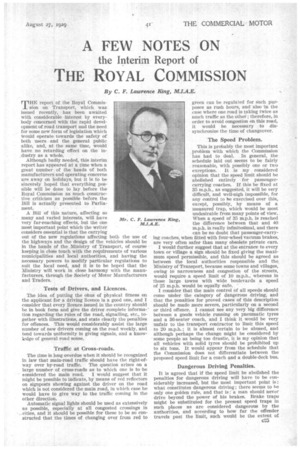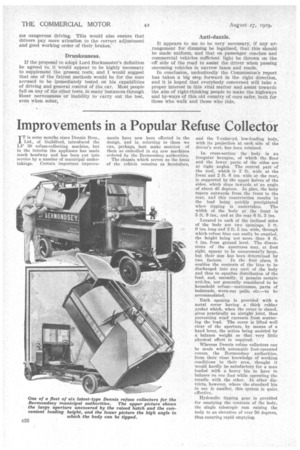A FEW NOTES ON
Page 47

Page 48

If you've noticed an error in this article please click here to report it so we can fix it.
the Interim Report of
THE ROYAL COMMISSION
By C. F. Lawrence King, M.LA.E.
MEM report of the Royal Commis sion on Transport, which was issued recently, has been awaited with considerable interest by everybody concerned with the rapid development of road transport and the need for some new form of legislation which would operate towards the safety of both users and the general public alike, and, at the same time, would have no retarding effect on the in, dustry as a whole.
Although badly needed, this interim report has appeared at a time when a great number of the heads of both manufacturers and operating concerns are away on holidays, but it is to be sincerely hoped that everything possible will be done to lay before the Royal Commission as much constructive criticism as possible before the Bill is actually presented to Parliament.
A Bill of this nature, affecting so many and varied interests, will have very far-reaching effects, but the citT most important point which the writer considers essential is that the carrying out of the new regulations affecting both the use of the highways and the design of the vehicles should be in the hands of the Ministry of Transport, of course keeping in close touch with the requirements of various municipalities and local authorities, and having the necessary powers to modify particular regulations to suit the local need, and it is to be hoped that the Ministry will work in close harmony with the manufacturers, through the Society of Motor Manufacturers and Traders.
Tests of Drivers, and Licences.
The idea of putting the °tins of physical fitness on the applicant for a driving licence is a good one,. and consider that every licence issued in the country should be in book form and give the driver complete information regarding the rules of the road, signalling, etc., together with illustrations, and state clearly the penalties for offences. This would considerably assist the large number of new drivers coming on the road weekly, and tend towards uniformity in giving signals, and a knowledge of of general road sense.
Traffic at Cross-roads.
The time is long overdue when it should be recognized in law that main-road traffic should have the right-ofway over by-road traffic. The question arises on a large number of cross-roads as to which one is to be tonsidered the main road. I would suggest that it might be possible to indicate, by means of red reflectors on signposts showing against the driver on the road which is not considered the main road, in which case he would have to give way to the traffic coming in the other direction.
Automatic signal lights should be used as extensively as possible, especially at all congested crossings in cities, and it should be possible for these to be so constructed that the times of changing over from red to green can be regulated for such purposes as rush hours, and also -in the case where one road is taking twice as much traffic as the other ; therefore, in order to avoid congestion on this road, it would be necessary to dissynchronize the time of changeover.
The Speed Problem.
This is probably the most important problem with which the Commission has had to deal. In general, the schedule laid out seems to be fairly reasonable, with possibly one or two exceptions. It is my considered opinion that the speed limit should be abolished entirely for passengercarrying coaches. If this be fixed at 35 m.p.h., as suggested, it will be very difficult, and well-nigh impossible, for any control to be exercised over this, except, possibly, by means of a measured trap, which would be most undesirable from many points of view. When a speed of 35 m.p.h. is reached the difference between that and 40 m.p.h. is really infinitesimal, and there can be no doubt that passenger-carrying coaches, when fitted with four-wheel vacuum brakes, are very often safer than many obsolete private cars.
I would further suggest that at the entrance to every town or village a sign should be fixed giving the maximum speed permissible, and this should be agreed as between the local authorities responsible and the Ministry of Transport, because some towns and villages, owing to narrowness and congestion of the streets, would require a speed limit of 10 m.p.h., whereas in those large towns with wide boulevards a speed of 25 m.p.h. would be equally safe.
I consider that the main control of all speeds should come under the category of dangerous driving, and that the penalties for proved eases of this descriptiOn should be made more severe, particularly on a second or third offence. I cannot see any very big difference between a goods vehicle running on pneumatic tyres and a 36-seater coach, and I think it would be very unfair to the transport contractor to limit this speed to 20 m.p.h.; it is almost certain to be abused, and although perhaps the change might be considered by some people as being too drastic, it is my opinion that all vehicles with solid tyres should be prohibited up to six tons. It would appear from the schedule that the Commission does not differentiate between the proposed speed limit for a coach and a double-deck bus.
Dangerous Driving Penalties.
It is agreed that if the speed limit be abolished the penalties for dangerous driving will have to be considerably increased, but the most important point is : what constitutes dangerous driving ; there seems to he only one golden rule, and that is : a man should never drive beyond the power of his brakes. Brake traps might be substituted for the present speed traps in such places as are considered dangerous by the authorities, and according to how far the offender travels past the limit, such would be the extent of ms dangerous driving. This would also ensure that drivers pay more attention to the correct adjustment and good working order of their brakes:
Drunkenness.
If the proposal to adopt Lord Buckmaster's definition be agreed to, it would appear to be highly necessary to supplement the present tests, and I would suggest that one of the fairest methods would be for the man accused to be ipmediately tested on his capabilities of driving and general control of the car. Most people fail on any of the other tests, in many instances through Sheer nervousness or inability to carry out the test, even when sober
Anti-dazzle.
It appears to me to be very necessary, if any arrangement for dimming be legalized, that this should be made uniform, and that on passenger coaches and commercial vehicles sufficient light be thrown on the off side of the road to assist the driver when passing oncoming vehicles in narrow lanes and roads.
In conclusion, undoubtedly the Commission's report has taken a big step forward in the right direction, and it is hoped that everybody concerned will take a proper interest in this vital matter and assist towards the aim of right-thinking people to make the highways and bY-ways of this old country of ours safer, both for those who walk and those who ride.












































































































